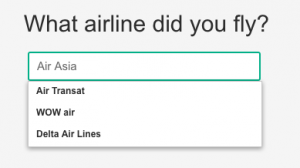I’ve always believed in the principle of “Give / Get” underpinning the basic premise that we cannot all be takers and that sharing involves two or more to engage. So back in 2005 I signed up to Trip Advisor and for the last 12 years I like millions of others have shared my observations on travel, food and accommodation. Why?
In the same way as people contribute to WikiPedia which consolidates and curates the knowledge of the many of a given topic it seemed to me only fair that if I were taking from something then I should give back. As part of this ‘social contract’ Trip Advisor regularly updates me on my standing in their community and informs me I have contributed 170 reviews and received 234 helpful votes.
 So yesterday having recently confirmed my participation in KM Asia 2017 and booked a flight from Hong Kong to Kuala Lumpur on AirAsia I decided to comment on a previous flight.
So yesterday having recently confirmed my participation in KM Asia 2017 and booked a flight from Hong Kong to Kuala Lumpur on AirAsia I decided to comment on a previous flight.
KIM’ers beware
 To my surprise having typed in Air Asia into Trip Advisor’s search box I got this set of drop down choices. It made no sense so I emailed them:
To my surprise having typed in Air Asia into Trip Advisor’s search box I got this set of drop down choices. It made no sense so I emailed them:
I cannot find Air Asia which operates from KL across Asia. Is it listed elsewhere? If not can you please show it.
Today I got this response:
We do list Air Asia, please find all airlines here www.tripadvisor.com/Airlines.
We list “AirAsia” all as one word which is consistent with their official brand; however I realize that it makes it difficult to find on our site as it is not natural to spell these two words without a space. As a result, it was not coming up in our search box. We have changed this to appear as two separate words which should allow easier access from now on. This change will take place on our live site within 24 hours.
Thanks for bringing this to our attention and do look forward to your review!
and finally
Their response was helpful but it highlights an issue that many organisations might have but not realise and why Knowledge & Information Managers should be on their guard when delivering search via drop down boxes to help people find ‘stuff’.
If the search engine is not tweaked to do what Verity’s Topic did some 20 years back namely look at all the various derivations of a name or phrase and present those in the results then the searcher has no idea if the term is correct and if he/she is getting a comprehensive results list.
Who in your organisation ‘owns’ search? I’m guessing that search is seen as technology and falls under IT’s remit. Yet it is a vital component of the KIM’ers tool set to help people in organisations know what it knows – the ‘Navigate’ competence I’ve written about previously.
